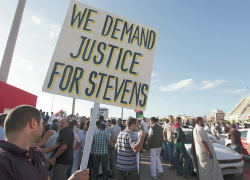
The attack on the United States consulate in Benghazi, Libya, which killed Ambassador Christopher Stevens and three other Americans, provoked widespread outrage not only in the international community, but among Libyans themselves. In the weeks since the attack, thousands of Libyans have joined protests against the radical militia believed responsible, as well as other militias that have been operating outside of government control since the fall of Muammar al-Qaddafi.
Early on September 22, protestors in Benghazi stormed the compounds of the Ansar al-Sharia Brigade and forced the group to flee the city. Militia fighters put up a brief fight, but a spokesman for the group later announced it had evacuated their base, claiming to have done so to preserve security. The takeover came after 30,000 people marched through Benghazi the previous day demanding the disbanding of the militias, in the city’s largest protest since the uprising against Qaddafi.
Following the Benghazi protests, Libya’s interim government announced it would disband all armed militias not under its authority. The government has struggled to form a cohesive national military or assert control over the numerous separate militias that formed during the civil war, but the consulate attack and the public backlash have increased pressure for more decisive action. Shortly after fleeing Benghazi, Ansar al-Sharia and another Islamist militia also evacuated bases in the nearby city of Derna, saying they would disband.
The backlash against the militias is a powerful example of the rejection of conservative Islamist and extremist groups that have made major political gains in other post-revolutionary countries in the Middle East. Libya’s first multi-party elections, held in July, were won by a moderate coalition, while parties linked to the Muslim Brotherhood and other Islamist groups fared poorly.
While security and the functioning of government in Libya are likely to be ongoing concerns, the response to the attack illustrates factors that make Libya distinctive among the countries emerging from the Arab Spring. First, the Libyan people continue to be engaged and ready to mobilize against potential threats to democratic development, and to demand better performance from their new government. They also are showing themselves more in favor of moderate politics and more resistant to religious, anti-Western politics than, for example, Egyptians. This presents an important opportunity for the United States to forge a positive relationship in the Middle East as it continues to transform.
Travis Gardner is a third year law student and a staff editor on the Denver Journal of International Law and Policy.


